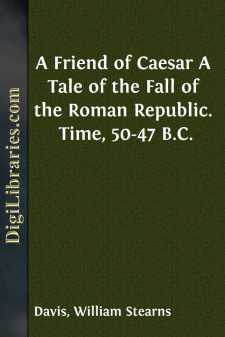Categories
- Antiques & Collectibles 13
- Architecture 36
- Art 48
- Bibles 22
- Biography & Autobiography 813
- Body, Mind & Spirit 142
- Business & Economics 28
- Children's Books 17
- Children's Fiction 14
- Computers 4
- Cooking 94
- Crafts & Hobbies 4
- Drama 346
- Education 46
- Family & Relationships 57
- Fiction 11829
- Games 19
- Gardening 17
- Health & Fitness 34
- History 1377
- House & Home 1
- Humor 147
- Juvenile Fiction 1873
- Juvenile Nonfiction 202
- Language Arts & Disciplines 88
- Law 16
- Literary Collections 686
- Literary Criticism 179
- Mathematics 13
- Medical 41
- Music 40
- Nature 179
- Non-Classifiable 1768
- Performing Arts 7
- Periodicals 1453
- Philosophy 64
- Photography 2
- Poetry 896
- Political Science 203
- Psychology 42
- Reference 154
- Religion 513
- Science 126
- Self-Help 84
- Social Science 81
- Sports & Recreation 34
- Study Aids 3
- Technology & Engineering 59
- Transportation 23
- Travel 463
- True Crime 29
A Friend of Caesar A Tale of the Fall of the Roman Republic. Time, 50-47 B.C.
Categories:
Description:
Excerpt
Præneste
I
It was the Roman month of September, seven hundred and four years after Romulus—so tradition ran—founded the little village by the Tiber which was to become "Mother of Nations," "Centre of the World," "Imperial Rome." To state the time according to modern standards it was July, fifty years before the beginning of the Christian Era. The fierce Italian sun was pouring down over the tilled fields and stretches of woodland and grazing country that made up the landscape, and the atmosphere was almost aglow with the heat. The dust lay thick on the pavement of the highway, and rose in dense, stifling clouds, as a mule, laden with farm produce and driven by a burly countryman, trudged reluctantly along.
Yet, though the scene suggested the heat of midsummer, it was far from being unrefreshing, especially to the eyes of one newly come. For this spot was near "cool Præneste," one of the favourite resorts of Latium to the wealthy, invalid, or indolent of Rome, who shunned the excessive heat of the capital. And they were wise in their choice; for Præneste, with its citadel, which rose twelve hundred feet over the adjoining country, commanded in its ample sweep both the views and the breezes of the whole wide-spreading Campagna. Here, clustering round the hill on which stood the far-famed "Temple of Fortune," lay the old Latin town of the Prænestians; a little farther westward was the settlement founded some thirty odd years before by Sulla as a colony. Farther out, and stretching off into the open country, lay the farmhouses and villas, gardens and orchards, where splendid nuts and roses, and also wine, grew in abundant measure.
A little stream ran close to the highway, and here an irrigating machine was raising water for the fields. Two men stood on the treadmill beside the large-bucketed wheel, and as they continued their endless walk the water dashed up into the trough and went splashing down the ditches into the thirsty gardens. The workers were tall, bronze-skinned Libyans, who were stripped to the waist, showing their splendid chests and rippling muscles. Beside the trough had just come two women, by their coarse and unpretentious dress evidently slaves, bearing large earthen water-pots which they were about to fill. One of the women was old, and bore on her face all the marks which a life of hard manual toil usually leaves behind it; the other young, with a clear, smooth complexion and a rather delicate Greek profile. The Libyans stopped their monotonous trudge, evidently glad to have some excuse for a respite from their exertions.
"Ah, ha! Chloë," cried one of them, "how would you like it, with your pretty little feet, to be plodding at this mill all the day? Thank the Gods, the sun will set before a great while. The day has been hot as the lap of an image of Moloch!"
"Well, Hasdrubal," said Chloë, the younger woman, with a pert toss of her head, "if my feet were as large as yours, and my skin as black and thick, I should not care to complain if I had to work a little now and then."
"Oh!...


